We may not have the course you’re looking for. If you enquire or give us a call on 01344203999 and speak to our training experts, we may still be able to help with your training requirements.
Training Outcomes Within Your Budget!
We ensure quality, budget-alignment, and timely delivery by our expert instructors.
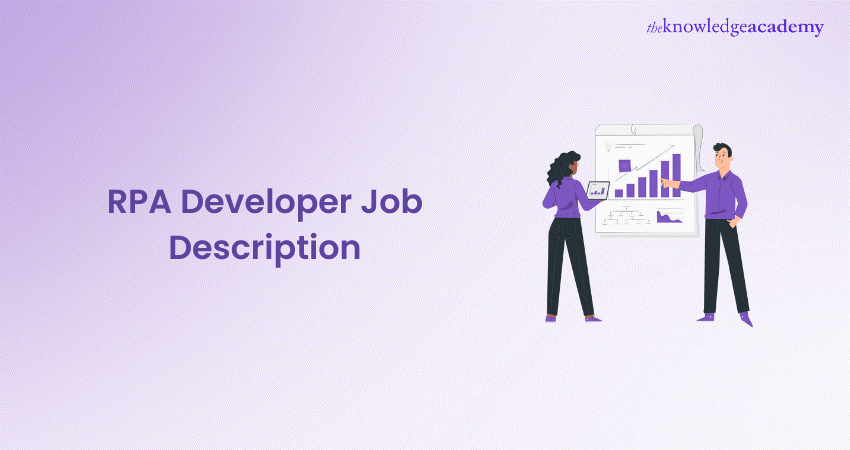
Are you excited about revolutionising business operations through automation? As an RPA Developer, you’ll be at the forefront of designing and implementing solutions that streamline workflows and boost efficiency. If you’re passionate about technology and love tackling complex problems, dive into the RPA Developer Job Description to discover the essential skills needed for success.
Table of Contents
1) What is RPA?
2) RPA Developer Responsibilities
3) RPA Developer Skills
4) Average Salary of RPA Developer
5) Examples of RPA Developer Job Description
6) How to Become an RPA Developer?
7) Conclusion
What is RPA?
Robotic Process Automation (RPA) uses software robots to automate repetitive tasks, enhance processes, and reduce errors. It also boosts operational efficiency by mimicking user actions in digital systems.
Tools like UiPath and Automation Anywhere are crucial for RPA Developers, enabling them to streamline workflows, minimise mistakes, and improve efficiency. These developers’ expertise in crafting and deploying robust automation solutions helps lower operational costs and improve organisational service delivery.
Automating rule-based tasks across various applications, RPA leads to significant cost savings and efficiency gains. As companies increasingly adopt RPA to stay competitive and adaptable in the fast-evolving digital landscape, the role of RPA Developers becomes ever more vital.
They are essential in designing, implementing, and managing these automation solutions, ensuring businesses can fully harness the benefits of RPA. Thus, they transform their processes and maintain a competitive edge.
RPA Developer Responsibilities
RPA Developers are essential when it comes to transforming business operations through automation. Let’s explore the RPA Developer’s responsibilities in detail,
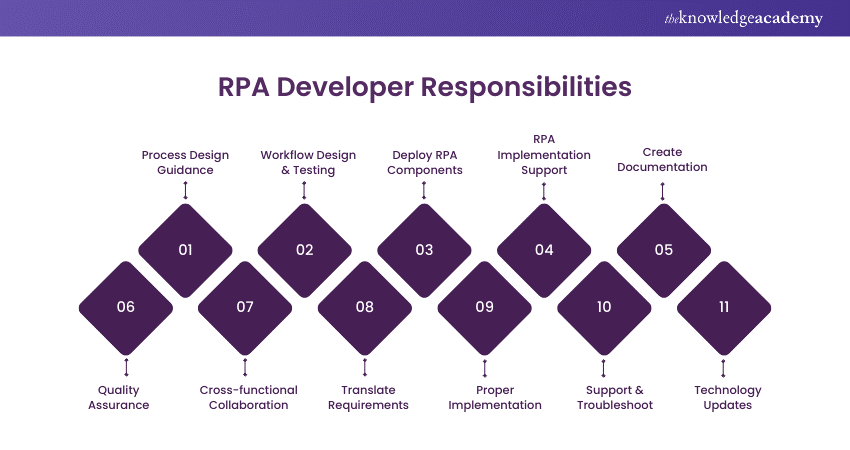
1) Process Design Guidance: Guide the process design by providing expert recommendations for creating efficient processes that are optimised for RPA integration.
2) Workflow Design & Testing: Design, create, and test automation workflows to guarantee they meet specifications and work smoothly.
3) Deploy RPA Components: Establish a solid automation infrastructure by deploying various RPA components such as bots, robots, development tools, code repositories, and logging tools.
4) RPA Implementation Support: Aid in the deployment and integration of RPA solutions by offering technical support.
5) Create Documentation: Produce detailed process and user documentation to enable comprehension and efficient utilisation of automation solutions.
6) Quality Assurance: Supervise quality assurance procedures to uphold the high performance and reliability of automated solutions.
7) Cross-functional Collaboration: Collaborate with Business Analysts, Scrum Masters, QA Analysts, Product Owners, and other colleagues to establish project requirements and provide effective business solutions.
8) Translate Requirements: Convert business requirements into technical designs and strategies for implementation by collaborating with stakeholders.
9) Proper Implementation: Work together with development team members to ensure that automation solutions are accurately put into place and merged with current systems.
10) Support & Troubleshoot: Help during deployments and address production problems, it also includes being on call, if necessary, to fix issues beyond normal working hours.
11) Technology Updates: Regularly update your understanding of pertinent technologies and business methods to guarantee that solutions stay up-to-date and efficient.
Solve your business operation issues with our OpenSpan RPA Training – Register now!
RPA Developer Skills
Candidates should possess practical experience using RPA tools and cognitive platforms like UiPath, Blue Prism, and Automation Anywhere, with a particular preference for expertise in UiPath.
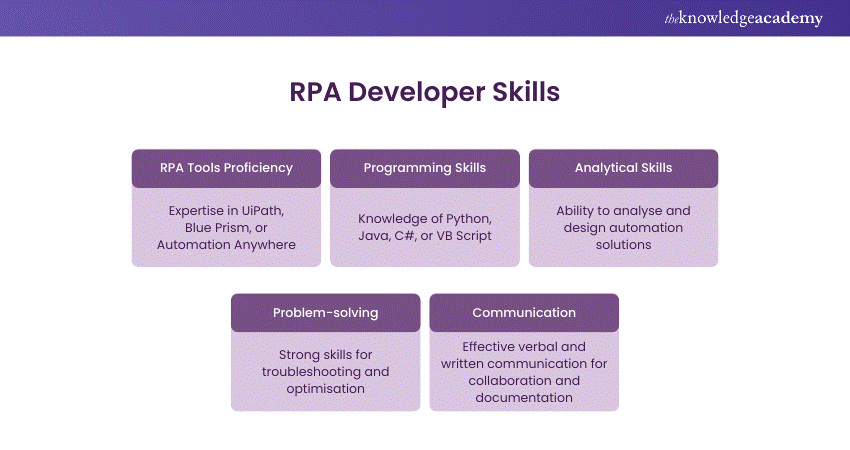
1) RPA Tools & Cognitive Platforms:
a) Practical experience with leading RPA tools such as UiPath, Blue Prism, and Automation Anywhere.
b) Strong preference for expertise in UiPath.
2) Programming Languages:
a) Minimum of two years of hands-on experience in languages such as C/C++, Python, VB Script, Ruby, Java, JavaScript, or .Net.
b) Basic understanding of HTML and JavaScript.
3) Technical Documentation & API Development:
a) Proficient in creating detailed technical specification documents for RPA projects.
b) Familiarity with API development and consumption.
4) Certifications:
a) UiPath RPA Developer certifications are preferred but not mandatory. Training will be provided if necessary.
5) Agile Methodologies & Database Skills:
a) Experience with Agile development methodologies.
b) Knowledge of SQL or NoSQL databases.
6) Artificial Intelligence & Machine Learning:
a) Solid understanding of AI and machine learning concepts.
b) Familiarity with workflow-based logic and strong analytical skills.
7) Soft Skills & Project Management:
a) Excellent time and project management abilities.
b) Capability to communicate technical information effectively to non-technical stakeholders.
c) Strong problem-solving and troubleshooting skills.
d) Ability to work independently, manage multiple tasks, and prioritise effectively in a fast-paced environment.
Average Salary of RPA Developer
The average salary of an RPA Developer highlights the strong demand for automation technology expertise. Let’s explore the average RPA Developer’s salary for the United Kingdom here:

Compensation varies based on experience, location, and industry, with competitive salaries often offered to skilled professionals in this field.
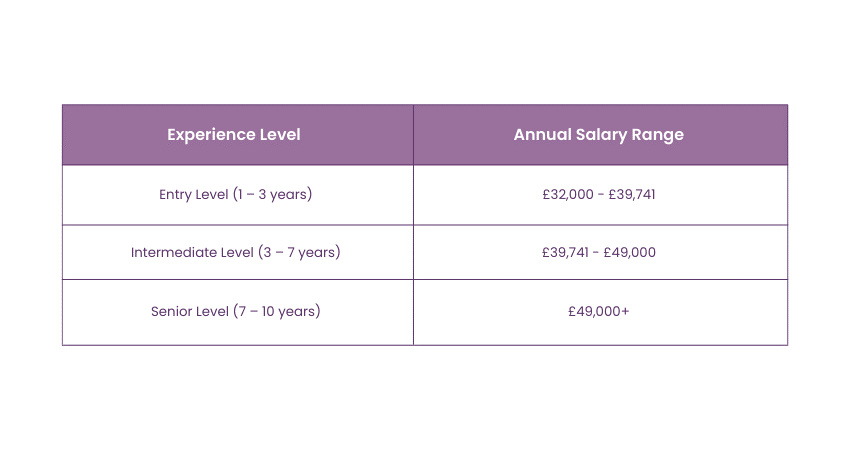
Source: Glassdoor
Examples of RPA Developer Job Description
Example:
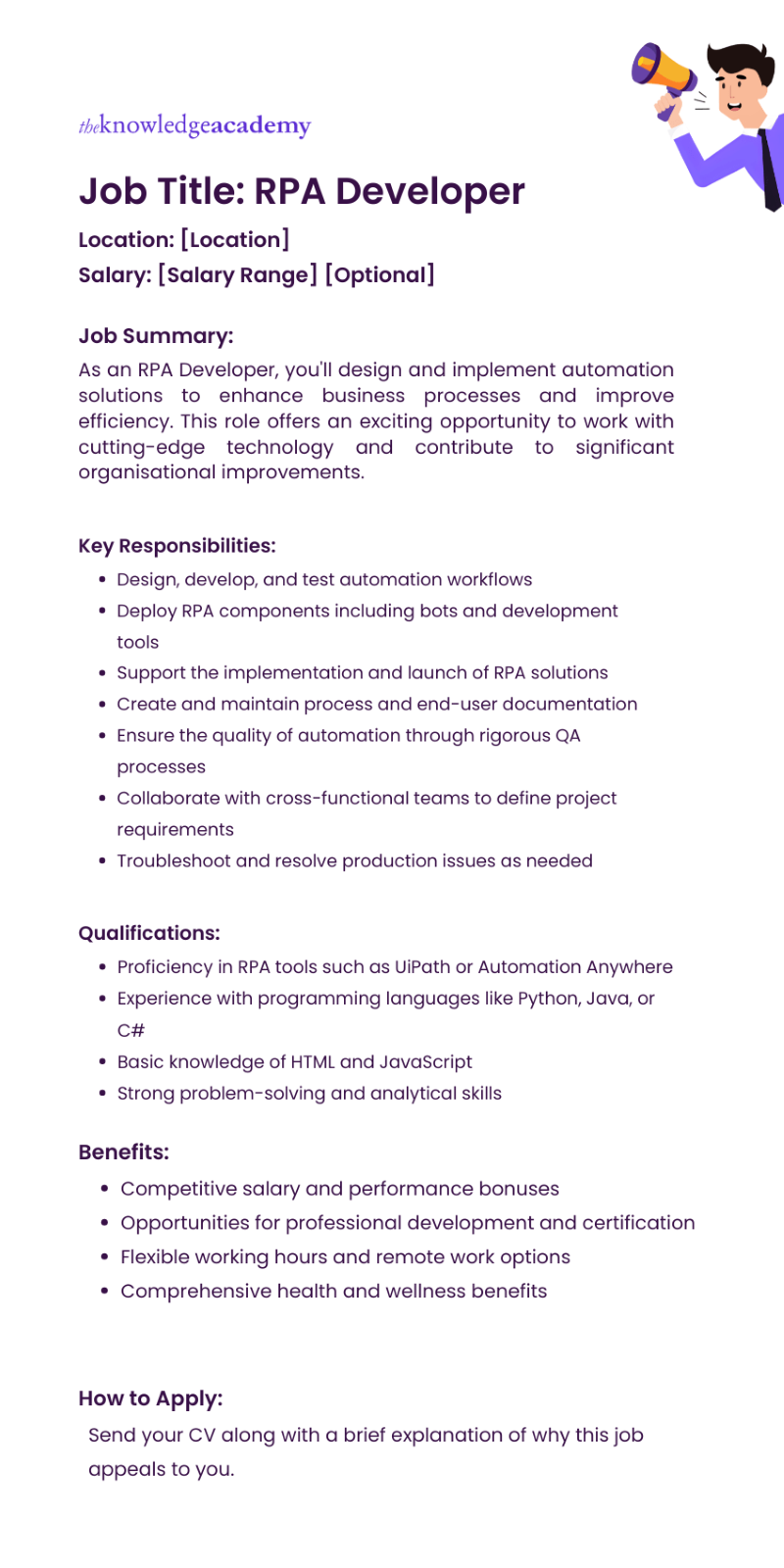
How to Become an RPA Developer?
To become an RPA Developer, you need the required education, experience and specialised training. Let’s see it step-by-step:
1) Educational Qualifications: Attain a Bachelor's degree in Computer Science, IT, or a relevant discipline. Having advanced degrees or certifications in RPA can be advantageous.
2) Gain Valuable Experience: Obtain experience in Software Development, Process Analysis, or Automation. Internships or junior-level positions offer valuable practical experience.
3) Learn RPA Tools: Acquaint yourself with well-known RPA tools such as UiPath, Automation Anywhere, or Blue Prism to learn RPA Tools. Engaging in online courses, certifications, and workshops can aid in developing skills and knowledge.
4) Develop Technical Skills: Improve your technical skills by advancing your programming abilities and knowledge in database management, API integrations, and workflow design.
5) Build a Portfolio: Develop a portfolio showcasing your skills in designing, developing, and implementing RPA solutions. This can demonstrate your abilities to prospective employers.
6) Apply for Jobs: Seek out openings for RPA Developer roles, adapting your resume and cover letter to showcase pertinent experience and skills.
Conclusion
The future of business automation relies heavily on RPA Developers. As outlined in the RPA Developer Job Description, these professionals enhance productivity by creating and integrating software robots to manage routine tasks, leading to greater efficiency and fewer errors. With the increasing demand for automation experts, pursuing a career as an RPA Developer offers a promising and impactful path. If you have a passion for technology and enjoy solving complex problems, this profession could lead to a fulfilling and exciting career.
Learn debugging skills with our Robotic Process Automation Using UiPath Course – Register now!
Frequently Asked Questions

Challenges in applying RPA include integrating with legacy systems, handling change within the organisation, and ensuring data security and compliance. Also, overcoming employee resistance and scaling automation across different processes. Successfully overcoming these issues necessitates thoughtful planning and effective management.

RPA addresses issues like reducing human error, improving process efficiency, automating repetitive tasks, and cutting operational costs. It also boosts accuracy and speed while ensuring consistency in compliance.

The Knowledge Academy takes global learning to new heights, offering over 30,000 online courses across 490+ locations in 220 countries. This expansive reach ensures accessibility and convenience for learners worldwide.
Alongside our diverse Online Course Catalogue, encompassing 19 major categories, we go the extra mile by providing a plethora of free educational Online Resources like News updates, Blogs, videos, webinars, and interview questions. Tailoring learning experiences further, professionals can maximise value with customisable Course Bundles of TKA.

The Knowledge Academy’s Knowledge Pass, a prepaid voucher, adds another layer of flexibility, allowing course bookings over a 12-month period. Join us on a journey where education knows no bounds.

The Knowledge Academy offers various Robotic Process Automation Training, including the Robotic Process Automation Using UiPath Course, Robot Framework Training, and OpenSpan RPA Training. These courses cater to different skill levels, providing comprehensive insights into How To Become A Robotics Engineer.
Our Advanced Technology Blogs cover a range of topics related to Robotic Process Automation, offering valuable resources, best practices, and industry insights. Whether you are a beginner or looking to advance your Robotic Process Automation skills, The Knowledge Academy's diverse courses and informative blogs have got you covered.
Upcoming Advanced Technology Resources Batches & Dates
Date
 Robotic Process Automation using UiPath
Robotic Process Automation using UiPath
Thu 13th Feb 2025
Thu 10th Apr 2025
Thu 12th Jun 2025
Thu 14th Aug 2025
Thu 9th Oct 2025
Thu 11th Dec 2025







 Top Rated Course
Top Rated Course



 If you wish to make any changes to your course, please
If you wish to make any changes to your course, please


